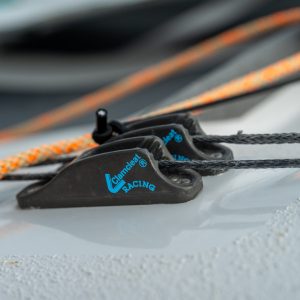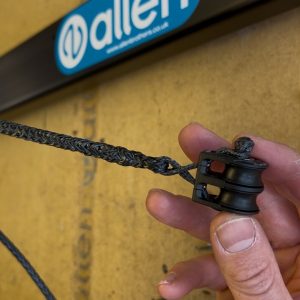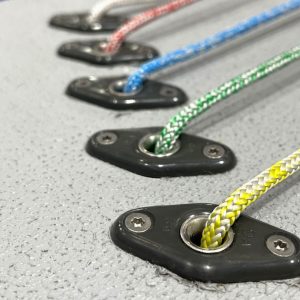Top Tips For Summertime Sessions!

Summer’s in full swing in the UK with some parts of the country hitting a whopping 36C recently. So, it’s no surprise then that many are leaping at the chance to get on the water! The team at Allen has a couple of top tips to consider when heading out in the heat!
UV Damages – Not only your skin but also rope, hardware and foils. It is vitally important to lather on the sun cream before heading out on the water, but it’s just as important to perform regular checks on hardware and rope that may be left out in the elements all year round. UV deteriorates most materials, including nylon, which is utilised in many Allen products. The plastic parts of the blocks and cleats may start to appear faded and they will start to become brittle if left to succumb to UV over long periods. The same goes for rope, it may start to appear faded and will lose strength as the fibre’s breakdown in the UV. It’s important to keep an eye on these fittings to avoid failures when on the water. You may also want to consider keeping your centreboard and rudder out of direct sunlight for long periods, as heat can cause some materials to warp and twist out of shape.
Fresh Water – Keeping hydrated in the heat is a key factor in maintaining performance when sailing, but, freshwater also extends the performance and life of your kit. If you sail in salty water, it’s important to always wash your boat and hardware off after each session. When seawater evaporates it leaves behind the salt crystals which can clog and even jam some bits of kit. If left to dry and not washed out, the salt will act in the same way as sand if it gets into your blocks and cleats, slowly wearing away the internal mechanisms reducing the performance and longevity of the product.
Bung removal – When storing a dinghy in the heat always remove the drainage bung or hatch covers to allow air circulation. Not only will this help keep your hull dry, but it will also stop the boat from popping. As the air inside the hull expands in the heat it will find a way to escape, usually through deck fittings, meaning that your dinghy is more likely to have small leaks when on the water. It is also important that you have a breather hole (usually a small hole in the hatch cover) to allow air to be sucked in or out. This is important when going from the land on a hot day to launching the dinghy into cold water. The air inside the boat will compact and, in some cases, could cause foredecks to concave under the pressure, weakening the integrity of the hull.
For more tips, rigging guides or general sailing news head over to www.allenbrothers.co.uk where you will also find the full range of Allen hardware available to purchase directly online. All Allen hardware is made in Essex, UK.
#equippedwithallen #madeintheUK #sailingtoptips




